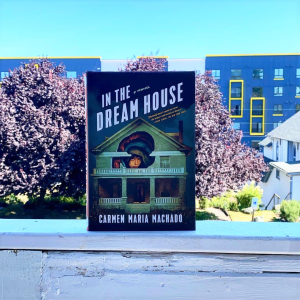Please note: This post discusses abusive relationships. If you or someone you know needs support regarding domestic or dating violence, please go to The National Domestic Violence Hotline or Rutgers Counseling Services.

Carmen Marie Machado (the first author being examined in our Summer Tales program) doesn’t pull punches when exposing the grotesque realities of humanity. In her debut memoir, In the Dream House: A Memoir, she uses the horror genre to expose and examine her own trauma from an abusive relationship. The relationship was with another woman, and Machado asserts in her prologue and footnotes that abuse in same-sex relationships, especially those involving two women, is a taboo subject rarely discussed (pg. 5, pg. 136, 2020). For Machado, it meant that she had no frame of reference for her experiences as she experienced them.
Relationships outside of heteronormativity are supposed to free us from the toxicity associated with gender norms. Still, as Machado points out, the binary idea that women (especially feminine women) are incapable of committing violence silences those in abusive relationships (pg. 137, pg. 199, 2020).

Machado’s work not only exposes the specific issue of abuse in same-sex relationships, it gives us language to address the feelings associated with trauma. Scholars working in Trauma Studies often assert that trauma itself bypasses language (Pillen, 2016). Without access to language that can name our experiences, we cannot process them.
Through her memoir, we see Machado process her trauma and unnameable experiences in real time. The process of reading it gives homage to her experience and allows readers a roadmap into what processing trauma can look like.
Machado speaks when some of us don’t yet have the language too. She weaves her language because no roadmap has been given to her. Her brief dedication of the memoir reads, “If you need this book, it is for you, ” which gives us all permission to take her stories and words and craft our roadmaps to healing. Her voice matters, and so does yours. Her story matters, and so does yours. Our stories and voices, and words add to a greater lexicon, and the more vocabulary we digest, the better able we are to understand ourselves and the worlds around us.
In this post
Machado, C. (2020). In the Dream House: A Memoir. Graywolf Press.
Pillen, A. (2016). Language, Translation, Trauma. Annual Review of Anthropology, 45(1), 95–111. https://doi.org/10.1146/annurev-anthro-102215-100232